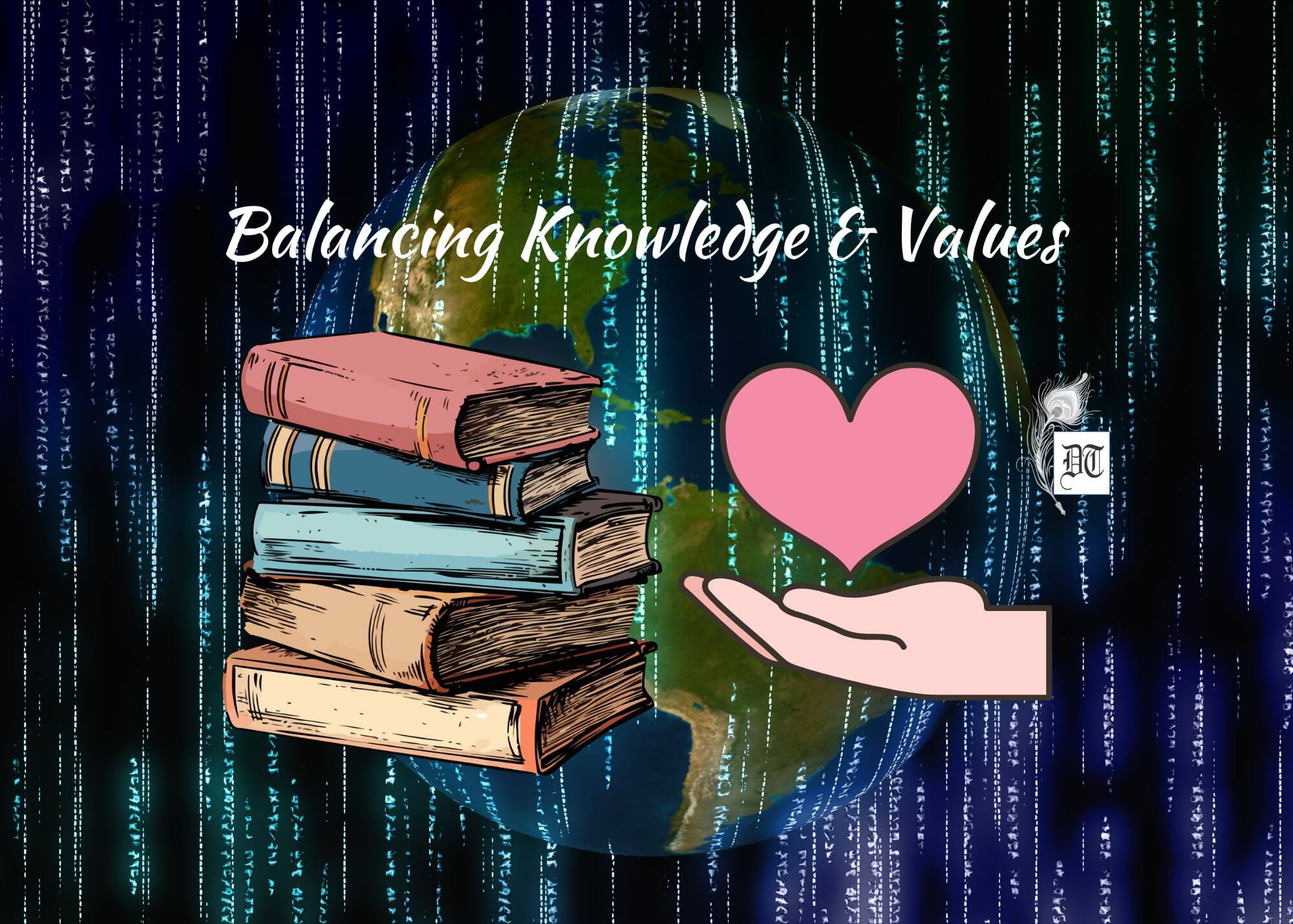Reading Time: 3 minutes
Saraswati, a traditional wisdom river, vanished, reflecting the erosion of values in an information-driven world. Raja Ravi Varma’s paintings remind us to reconnect with forgotten values during Saraswati Puja, deliberates Shaivya, in the Special Feature, exclusively for Different Truths.

The river ‘Saraswati’, an embodiment of knowledge and values, often referred to as the ‘river of knowledge’, holds a significant place in Indian culture. It symbolises the flow of values and wisdom that nurtured civilisation along its banks. Over time, the river vanished from the physical world, reflecting the fading awareness and value of traditional wisdom.
The concept of knowledge took on new forms as societies evolved. The river once considered a ‘quest for enlightenment and knowledge’ metamorphosed into just a symbolic representation, flowing with the currents of cultural evolution. This transition was manifested in the worship of ‘Saraswati’ as a deity of wisdom. People sought her blessings for academic success, artistic excellence, and the embodiment of virtues and principles. The rationale for worship lies in the belief that knowledge is the divine power that enlightens and elevates the individual and society.
The dynamics of knowledge have experienced a radical shift in today’s world. Globalisation and technological advancements have revolutionised the way we acquire and share information. Once bound to traditional methods, education has broadened its horizons, embracing diverse mediums and platforms. ‘Saraswati’, once esteemed as the embodiment of knowledge and values, appears to have retreated, leaving us with fragments of knowledge but devoid of a moral compass. The river, once an abundant wealth of cultural, moral, and spiritual values, has given way to a society that is fixated on the superficiality of mere literacy. The capability to read and write without a deeper understanding and embodiment of the values accompanying the knowledge.
The ‘vilupt’ Saraswati… breathed new life into the mythic essence of our deity…
The ‘vilupt’ Saraswati, once regarded as the embodiment of wisdom and knowledge, breathed new life into the mythic essence of our deity Saraswati through the evocative paintings of Raja Ravi Varma. Today, we venerate the artistic portrayal of the reimagined divine figure radiating knowledge and enlightenment, keeping alive the spirit of creativity and knowledge that the river once symbolised.
This reflection becomes significant during the celebration of ‘Saraswati Puja’ in worship of the goddess Saraswati. This occasion is a reminder of the ideals that ‘Saraswati’ embodies. It provides people with an opportunity to reconnect with their lost values and integrate them into their lives. The worship, practices, and rituals associated with ‘Saraswati Puja’ are symbolic gestures to attain a holistic and deeper understanding of knowledge beyond the acquisition of information.
The disappearance of Saraswati has left a vacuum and mirrors our contemporary world. The focus has now shifted toward superficial things—the acquisition of facts and figures without a comprehensive understanding that knowledge is not just about information but also about the integration of values. The erosion of moral values parallels the disappearance of the river.
Personal gain overshadows communal well-being, instant gratification prevails over endurance, and material success blinds ethical considerations. While the literacy rate rises, cultural and moral values seem to erode. It is challenging to contemplate the seemingly vanished essence of knowledge. The comprehension of knowledge is rooted in moral principles, dedication, and compassion for people.
As literacy evolves, so do our values. The juxtaposition of literacy and values is not only fascinating but also concerning in today’s technology-driven world. Technology and literacy are intrinsically linked in the minds of our youth. Technology has enhanced literacy skills in the modern world but also presents challenges.
The digital age offers convenience to youth but has erased dedication.
Technology provides instant access to a wealth of information; students can use digital devices to learn about diverse topics and expand their knowledge. But the decline in reading physical books is a concern. Technology encourages quick consumption of bite-size information. Digital screens and printed books engage the human brain in different ways. The digital age offers convenience to youth but has erased dedication.
Instant gratification competes with the patience required for deep learning. It is crucial to balance quick information retrieval with sustained effort. It amplifies both positive and negative behaviours. Literacy is not just about the decoding of words; it is about understanding the context, ethics, and empathy. It is our choice to determine its impact.
The disappearance of the ‘river’ Saraswati reminds us to seek knowledge beyond the superficial and the worship of the ‘deity’ Saraswati, in today’s time, is a call to strive for a balance between knowledge and wisdom, between learning and understanding. It is a call to remember that true knowledge is not just about accumulating information but about how we use that information to better ourselves and the world around us. Perhaps in doing so, we can rediscover the essence of knowledge, the eternal flow that can enrich our minds and souls alike.
Picture design by Anumita Roy















